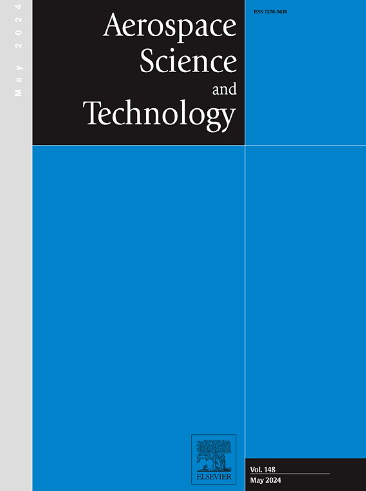具有相对冲击速度和攻角约束的三维容错协同制导律
IF 5.8
1区 工程技术
Q1 ENGINEERING, AEROSPACE
引用次数: 0
摘要
为了进一步提高导弹群的稳定性和打击能力,在电子对抗和精确打击的背景下,提出了一种具有相对冲击速度和攻角约束的三维容错协同制导律。该制导律利用分数阶幂扩展状态观测器(FPESO)在线估计敌方目标的加速度,并在传统的PID滑模曲面中引入非线性项,推导出新的非线性PID滑模曲面(NPIDSMC)。考虑到合作过程中的通信容易受到干扰,针对不同程度的干扰,提出了不同的解决方案。仿真结果表明,在理想条件和轻微干扰下,所提出的FTC-NPIDSMC-FPESO协同制导律能够以理想的冲击速度和攻角实现协同打击。在光干扰下,通过拓扑交换处理通信干扰和节点故障。在通信干扰严重的情况下,将容错备份选项切换为定时开环协同打击,确保打击任务的成功执行。蒙特卡罗仿真进一步验证了该容错协同制导律在电子对抗环境下具有较强的适应性和稳定性。本文章由计算机程序翻译,如有差异,请以英文原文为准。
Three-dimensional fault-tolerant cooperative guidance law with constraints on relative impact velocity and attack angle
In the context of electronic countermeasures and precision strikes, this paper proposes a three-dimensional fault-tolerant cooperative (FTC) guidance law with constraints on relative impact velocity and attack angle to further improve the stability and strike capability of a missile swarm. The guidance law uses Fractional Power Extended State Observer (FPESO) to estimate the acceleration of the enemy target online, and introduces a nonlinear term into the traditional PIDSMC to derive the novel nonlinear PID sliding mode surface (NPIDSMC). Considering that communication in the cooperative process is prone to interference, different solutions are proposed for varying levels of interference. Simulation results show that, under ideal conditions and light interference, the proposed FTC-NPIDSMC-FPESO cooperative guidance law can achieve cooperative strikes with the desired impact velocity and attack angle. Under light interference, communication interference and node failures are handled through topology switching. In the case of severe communication interference, a fault-tolerant backup option is switched to fixed-time open-loop cooperative strikes to ensure the successful execution of the strike mission. Monte Carlo simulations further verify that the fault-tolerant cooperative guidance law exhibits strong adaptability and stability in electronic countermeasure environments.
求助全文
通过发布文献求助,成功后即可免费获取论文全文。
去求助
来源期刊

Aerospace Science and Technology
工程技术-工程:宇航
CiteScore
10.30
自引率
28.60%
发文量
654
审稿时长
54 days
期刊介绍:
Aerospace Science and Technology publishes articles of outstanding scientific quality. Each article is reviewed by two referees. The journal welcomes papers from a wide range of countries. This journal publishes original papers, review articles and short communications related to all fields of aerospace research, fundamental and applied, potential applications of which are clearly related to:
• The design and the manufacture of aircraft, helicopters, missiles, launchers and satellites
• The control of their environment
• The study of various systems they are involved in, as supports or as targets.
Authors are invited to submit papers on new advances in the following topics to aerospace applications:
• Fluid dynamics
• Energetics and propulsion
• Materials and structures
• Flight mechanics
• Navigation, guidance and control
• Acoustics
• Optics
• Electromagnetism and radar
• Signal and image processing
• Information processing
• Data fusion
• Decision aid
• Human behaviour
• Robotics and intelligent systems
• Complex system engineering.
Etc.
 求助内容:
求助内容: 应助结果提醒方式:
应助结果提醒方式:


